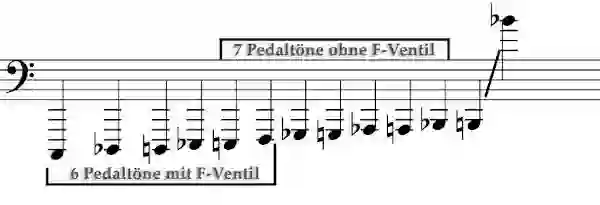Notation and sound generation » Trombone » Philipp Dangas
Notation and sound generation of the Trombone
The trombone belong to the non-transposing instruments. Their notation, in which all clefs from soprano to bass clef were used in the past, is now only made in tenor and bass clef, for the alto trombone also in the alto clef and in some modern works also in the treble clef. In any case, it corresponds to the actual sound, there is no uniform "fingerprint" as with the transposing instruments.
The tuning of the basic scale i.e. the "tuning of the instrument" is not added to the trombone designation. Basically, trombones are whole instruments, i.e. they can play the root and at least some of the pedal tones below the root. When the bass trombone valve is closed, the same applies as for d, except that b1 should be specified as the upper limit of the scale.
The length of the slide of the tenor bass trombone, like that of the tenor trombone, is measured in such a way that the tuning B (1st position) that results when the valve is closed can be transported down to 6 further positions after the E tuning (7th position). In this case, when the train is fully extended without opening the valve, the total length of the tube is 4.12 meters.
The tenor bass trombone has become the standard trombone in many orchestras. It can be described as a combination of a tenor and a bass trombone. With the fourth valve not pressed, it is a tenor trombone otherwise a bass trombone.
[music by Dmitri Shostakovich]
Download size: 135 kilobytes
Table summary for trombone valve switching
The following table shows the technical representation of the valve circuit of the trombone shown.

The tonal range of a bass trombone in large scale
Internal search function
| Name | Value | Delete |
|---|